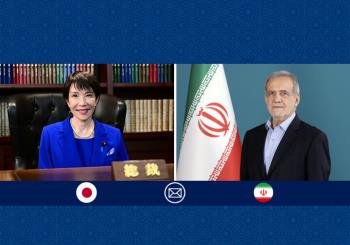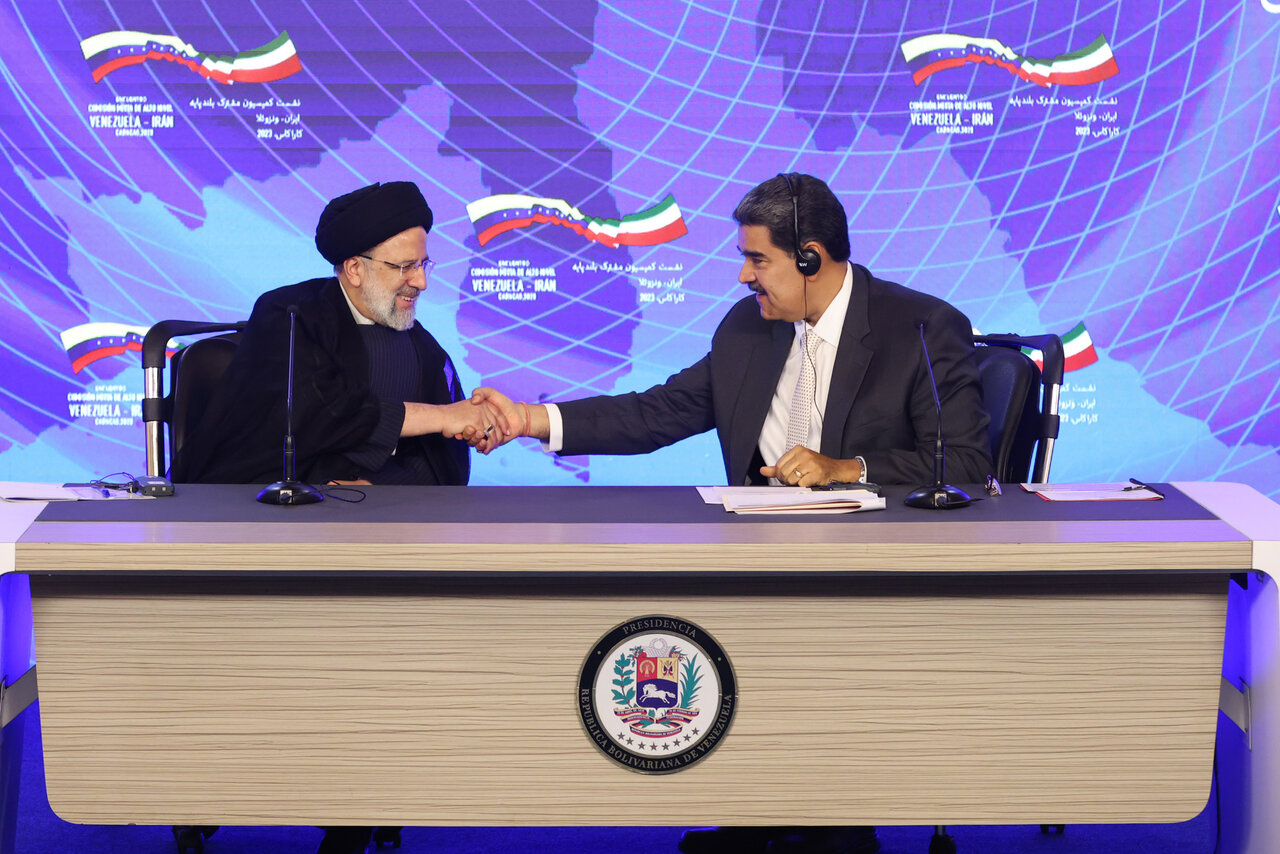Alwaght- With the administration of Seyyed Ibrahim Raisi of Iran prioritizing economic and trade relations with the world in foreign policy and diplomacy, the president over the past two years of his presidency has paid multiple foreign trips, demonstrating that various world countries are ready to expand ties with the Islamic Republic.
After visits to China, Russia, Central Asian states, and Syria, where he signed multiple economic pacts, President Raisi chose Venezuela in Latin America as the latest destination of his tour to boost bilateral relations.
On Monday, President Raisi arrived in Caracas, the capital of Venezuela, heading a high-level economic and political delegation on a five-day tour of Latin America, and was welcomed by the country's president, Nicolás Maduro. The two sides discussed bilateral relations and strengthening cooperation. Nicaragua and Cuba are the next destinations of the president's official visit to the Latin America.
A leap to $20 billion trade
Last year, Iran and Venezuela signed a 20-year comprehensive strategic cooperation document, the main goal of which was to upgrade their partnership to strategic levels in various areas of cooperation.
In the joint press conference with Maduro, Raisi stressed that the relations between Iran and Venezuela were not ordinary but strategic. He added that having common interests, views, and enemies has made their cooperation deep and strategic. Referring to the increase in their trade volume between the two countries from $600 million in 2021 to more than $3 billion at the moment, Raisi held that bilateral trade can increase to $10 billion in first phase and $20 billion in the next phase.
On the other hand, Venezuelan president Maduro said: “As one of the most important emerging powers in the new world, Iran plays a leading role. We are on the right side of history and together with Iran we will be invincible."
He also called on Iranian counterpart’s further support for expansion of scientific and technological partnership.
In this visit, the officials of the two countries signed 19 cooperation agreements in areas of communication and IT, energy, insurance, maritime transport, higher education, agriculture, medicine and medicine, culture, and mining.
Talks with the heads of the commissions of the National Assembly of Venezuela and meetings of businessmen of Iran and Venezuela were part of the plans of trip to Venezuela.
Iran and Venezuela have had close relations over the past two decades and uplifted their level of economic partnership. In 2020, Iran sent about 1.5 million barrels of gasoline and other fuel derivatives to Venezuela to meet its needs, angering the US. Iran has also helped to repair and re-operate Venezuela’s oil refineries, and their bilateral relations is expected to reach its highest level in the coming years. Although Venezuela has the largest oil reserves in the world, it is facing problems producing gasoline and diesel, and Tehran can help its ally in this field as infrastructure is also provided.
Earlier, Iran partnered Venezuela in car, cement, dairy, and housing sectors, and if the same partnership is executed in other Latin American states, it brings about a great victory for Tehran.
Like Iran, Latin American countries have faced economic sanctions and threats from the US in recent decades, and this common challenge has pushed them towards greater convergence. Tehran is expected to help its partners in facing this challenge due to its successful experience in circumventing the sanctions. American governments have spent billions of dollars to remove the national leaders in Latin America and install pro-Western minions, and in Iran, they also plotted a coup against the government of Mohammad Mossadegh in 1953 who nationalized Iran's oil. In this case, too, the two sides share views as they fight the American imperialism.
Pointing to this issue, Raisi in his meeting with Maduro lauded the years-long resistance of the people of Venezuela to American imperialism, adding: “Iran and Venezuela have common interests and views in the fields of independence, freedom and justice, which brings the people of these two countries together.” The president also stated that the people of Iran and Venezuela have common enemies who “do not want us to live independently.”
“The Iranian nation has proven its friendship with the Venezuelan people over the past years and has always shown that it is their friend in their difficult times, ” the Iranian president added.
Growing Latin America significance for world powers
Caribbean countries have many capacities that will play an important role in economic alliances of the future. Fertile agricultural lands along with advanced industries and huge mines have turned Latin America into a precious gem captivating attention of all countries.
The fact that Russia, China, and powerful European countries try to deepen relations with Latin America and have so far inked many contracts with its countries is indicative of the position of this region in the future developments.
Statistics suggest that 25 percent of the forest and arable lands are located in this region. Also, 65 percent of the world's lithium reserves, 42 percent of the silver reserves, 38 percent of the copper reserves, and 21 percent of the world's iron reserves have made Latin America one of the resource-richest regions in the world, and these huge capacities are a good opportunity for Iran to improve its position in the world arena by bolstering partnership with this region. For example, despite the extensive US sanctions, Cuba is one of the leading countries in the world in the field of medicine and pharmaceuticals, allowing it neutralize many of the restrictions caused by sanctions.
Latin American countries are mostly left-wing governments and oppose the continuous US interference in regional developments, and for this reason, they face economic pressure from the US, which has caused these countries to become closer to independent governments such as Russia, China, and Iran. The attempt to join the BRICS economic bloc under the leadership of Russia and China is made with this goal.
Washington’s power decline and Tehran's power show-off
Global changes show that a new global order is in the making, in which the US will not be the dominant power. While the US is losing its power after several decades of military conflict in West Asia and the Arab countries are taking steps to break up with their Western ally, the Islamic Republic of Iran is tightening its foothold just next to the US.
Iran has learned well how to infiltrate the US backyard. After sending oil tankers to Venezuela and docking of naval ships in Brazil, it has now chosen to develop economic relations to challenge Washington's policies.
Last year, Iran, along with China and Russia, conducted military drills on the Venezuelan soil, sending a warning to the US that the hit and run era has gone and the rivals have gained the power to deal blows to the US interests in reciprocation. Russia and China have made a lot of investments in Latin American mining and energy infrastructure, and Iran can also have a significant presence in the Caribbean. Washington officials have expressed concern about growing Chinese, Russian, and Iranian bonds with Latin America, still they have to tolerate the growing power of Tehran just next door.
Tehran-Caracas trade volume increase to $20 billion and also signing multi-billion MoUs with Nicaragua and Cuba are part of Iranian gains against the American imperialist policies. Actually, diversification of allies on the world stage blocks Washington's capability to easily build economic pressures on Tehran. Due to its capacities, Latin America can play an important role in this case.
Washington intended to form a coalition in West Asia and isolate Iran, but now it is under pressure from Tehran-Moscow-Beijing triangle in its alleged backyard. In other words, on the 200th anniversary of the declaration of the Monroe Doctrine, Latin America is not only no longer the US backyard, but also under the Moscow-Tehran-Beijing alliance, it has become more of a threat zone against it.
On the hand, Venezuelan president recently met the US ally Saudi Crown Prince Mohammed bin Salman, something indicating that Washington foes not only challenge its power in Latin America, but also seek to curtail its influence in the Persian Gulf, and this demonstrates decline of the US power to impact global developments.



























